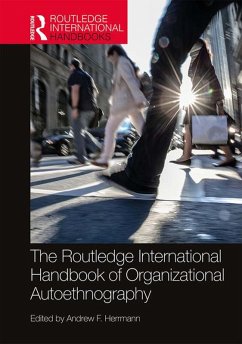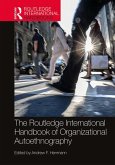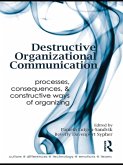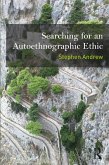The Routledge International Handbook of Organizational Autoethnography (eBook, ePUB)
Redaktion: Herrmann, Andrew
49,95 €
49,95 €
inkl. MwSt.
Sofort per Download lieferbar

25 °P sammeln
49,95 €
Als Download kaufen

49,95 €
inkl. MwSt.
Sofort per Download lieferbar

25 °P sammeln
Jetzt verschenken
Alle Infos zum eBook verschenken
49,95 €
inkl. MwSt.
Sofort per Download lieferbar
Alle Infos zum eBook verschenken

25 °P sammeln
The Routledge International Handbook of Organizational Autoethnography (eBook, ePUB)
Redaktion: Herrmann, Andrew
- Format: ePub
- Merkliste
- Auf die Merkliste
- Bewerten Bewerten
- Teilen
- Produkt teilen
- Produkterinnerung
- Produkterinnerung

Bitte loggen Sie sich zunächst in Ihr Kundenkonto ein oder registrieren Sie sich bei
bücher.de, um das eBook-Abo tolino select nutzen zu können.
Hier können Sie sich einloggen
Hier können Sie sich einloggen
Sie sind bereits eingeloggt. Klicken Sie auf 2. tolino select Abo, um fortzufahren.

Bitte loggen Sie sich zunächst in Ihr Kundenkonto ein oder registrieren Sie sich bei bücher.de, um das eBook-Abo tolino select nutzen zu können.
This book maps the interdisciplinary field of organizational autoethnography. It provides a lens that shifts from the dominant paradigm of meta-level organisational discourse to look at how the individual's experience affects wider factors like business productivity, community and families.
- Geräte: eReader
- mit Kopierschutz
- eBook Hilfe
Andere Kunden interessierten sich auch für
![The Routledge International Handbook of Organizational Autoethnography (eBook, PDF) The Routledge International Handbook of Organizational Autoethnography (eBook, PDF)]() The Routledge International Handbook of Organizational Autoethnography (eBook, PDF)49,95 €
The Routledge International Handbook of Organizational Autoethnography (eBook, PDF)49,95 €![Organizational Ethnography (eBook, ePUB) Organizational Ethnography (eBook, ePUB)]() Organizational Ethnography (eBook, ePUB)48,95 €
Organizational Ethnography (eBook, ePUB)48,95 €![Destructive Organizational Communication (eBook, ePUB) Destructive Organizational Communication (eBook, ePUB)]() Destructive Organizational Communication (eBook, ePUB)57,95 €
Destructive Organizational Communication (eBook, ePUB)57,95 €![Searching for an Autoethnographic Ethic (eBook, ePUB) Searching for an Autoethnographic Ethic (eBook, ePUB)]() Stephen AndrewSearching for an Autoethnographic Ethic (eBook, ePUB)42,95 €
Stephen AndrewSearching for an Autoethnographic Ethic (eBook, ePUB)42,95 €![Assessing Autoethnography (eBook, ePUB) Assessing Autoethnography (eBook, ePUB)]() Andrew F. HerrmannAssessing Autoethnography (eBook, ePUB)42,95 €
Andrew F. HerrmannAssessing Autoethnography (eBook, ePUB)42,95 €![Revision (eBook, ePUB) Revision (eBook, ePUB)]() Carolyn EllisRevision (eBook, ePUB)42,95 €
Carolyn EllisRevision (eBook, ePUB)42,95 €![Multigenerational Communication in Organizations (eBook, ePUB) Multigenerational Communication in Organizations (eBook, ePUB)]() Michael G. StrawserMultigenerational Communication in Organizations (eBook, ePUB)21,95 €
Michael G. StrawserMultigenerational Communication in Organizations (eBook, ePUB)21,95 €-
-
-
This book maps the interdisciplinary field of organizational autoethnography. It provides a lens that shifts from the dominant paradigm of meta-level organisational discourse to look at how the individual's experience affects wider factors like business productivity, community and families.
Dieser Download kann aus rechtlichen Gründen nur mit Rechnungsadresse in A, B, BG, CY, CZ, D, DK, EW, E, FIN, F, GR, HR, H, IRL, I, LT, L, LR, M, NL, PL, P, R, S, SLO, SK ausgeliefert werden.
Produktdetails
- Produktdetails
- Verlag: Taylor & Francis eBooks
- Seitenzahl: 542
- Erscheinungstermin: 16. Juli 2020
- Englisch
- ISBN-13: 9780429614903
- Artikelnr.: 59775083
- Verlag: Taylor & Francis eBooks
- Seitenzahl: 542
- Erscheinungstermin: 16. Juli 2020
- Englisch
- ISBN-13: 9780429614903
- Artikelnr.: 59775083
- Herstellerkennzeichnung Die Herstellerinformationen sind derzeit nicht verfügbar.
Andrew F. Herrmann is an Associate Professor of Communication Studies at East Tennessee State University, where he teaches organizational and professional communication, communication technology, and personal narrative courses. His critical research focuses on identity, narrative, and power at the intersections of organizational, occupational, and popular culture contexts.
List of Figures
List of Tables
Acknowledgements
Preface: Organizing a Handbook and What's Inside
Andrew F. Herrmann
Section I: Situating Organizational Autoethnography
1. The Historical and Hysterical Narratives of Organization and Autoethnography
Andrew F. Herrmann
2. Life between Interlocking Oppressions: An Intersectional Approach to Organizational Autoethnography
Helena Liu
3. Autoethnography through the Prism of Foucault's Care of the Self
Leah Tomkins
4. Queering Organizational Research Through Autoethnography
Jamie McDonald and Nick Rumens
5. Postcolonial Organizational Autoethnography: Journey into Reflexivity, Erasures, and Margins
Mahuya Pal, Beatriz Nieto Fernandez, and Nivethitha Ketheeswaran
6. Aggression, Bullying and Mobbing in the Workplace: An Autoethnographic Exploration
Mpho M. Pheko, Thabo L. Seleke, Joy Tauetsile, and Motsomi N. Marobela
Section II: Autoethnography Across Organizational Disciplines
7. On Not Seeing Myself in the Research on Veterans
Jeni R. Hunniecutt
8. Navigating the Narrow Spaces: A Critical Autoethnography of Life in the (Postmodern) Neoliberal University
Christopher N. Poulos
9. Autoethnography and Information Technology
Niamh Riordan
10. Organizational Autoethnographies of Economy, Finance, Business and Management: Reflections and Possibilities
Jeff Hearn, Karl-Erik Sveiby, and Anika Thym
11. The Discomfort of Autoethnography in Academic Marketing Research
Chris Hackley
Section III: Organizations and Organizing
12. Billable (H)ours: Autoethnography, Ambivalence, and Academic Labor in a Healthcare Organization
Nicole Defenbaugh, Jay Baglia, and Elissa Foster
13. Birthing Autoethnographic Philanthropy, Healing, and Organizational Change: That Baby's Name
Abby Lackey
14. Organizing Desire: The Queer Bar
Tony E. Adams
15. Polypreneur: An Autoethnography of Owning Multiple Businesses, Simultaneously
Stephanie K. Webb
16. Organizational Resistance and Autoethnography
Sanne Frandsen and R. Duncan M. Pelly
Section IV: Organizing Organizational Identities
17. Grieving Kathy: An Interactional Autoethnography of Cultivating Sustainable Organizations
Danielle M. Stern and Linda D. Manning
18. Finding the "I" in Fan: Organizing Around Performed Identities within Fan Spaces
Adam Tyma
19. Pieced Together. Writing Invisible (Dis)abilities in Academia
Katrine Meldgaard Kjær and Noortje van Amsterdam
20. "Switch Off the Headwork!": Everyday Organizational Crossings in Identity Transformations from Academic to Distance Runner
Jacquelyn Allen-Collinson and John Hockey
21. An Autoethnographic Account of (Pre)Retirement Socialization: Examining Anticipatory Messages About Workforce Exit
Lindsey B. Anderson
22. Walking Home: An Autoethnography of Hiking, Cultural Identity, and (De)colonization
Phiona Stanley
Section V: Writing and Evaluating Organizational Autoethnography
23. Learning through the Process: Failure, Frustration and Forward Movement in Autoethnography
Katherine Denker, Kayla Rausch, and Savaughn Williams
24. The IRB's Stone Wall: Rollercoaster of Doom
Thomas W. Townsend, Angela Duggins, Brandon Bragg, Tess McCoy, Juliette Guerrault, Jessica Newell, and Hannah Tiberi
25. Anchoring the Big Tent: How Organizational Autoethnography Exemplifies and Stretches Notions of Qualitative Quality
Cary J. S. López and Sarah J. Tracy
26. Towards a Model of Collaborative Organizational Autoethnography: The More the Merrier?
Sally Sambrook and Clair Doloriert
27. Autoethnographic Data as Abductive Experiences
Wafa Said Mosleh
Section VI: Organizing the Future of Organizational Autoethnography
28. Framing Stories from the Academic Margins: Documentary as Qualitative Inquiry and Critical Community Engagement
Brian Johnston
29. Time and the Writing of Personal Narratives in Organizational Ethnography
Mette Gislev Kjærsgaard and Henry Larson
30. Organizing Autoethnography on the Internet: Models and Challenges
Maha Bali
31. A CCO Perspective on Autoethnography: Researching, Organizing and Constituting
Frédérik Matte and Geneviève Boivin
32. Conclusion: Organizing the Future of Organizational Autoethnography
Andrew F. Herrmann
List of Tables
Acknowledgements
Preface: Organizing a Handbook and What's Inside
Andrew F. Herrmann
Section I: Situating Organizational Autoethnography
1. The Historical and Hysterical Narratives of Organization and Autoethnography
Andrew F. Herrmann
2. Life between Interlocking Oppressions: An Intersectional Approach to Organizational Autoethnography
Helena Liu
3. Autoethnography through the Prism of Foucault's Care of the Self
Leah Tomkins
4. Queering Organizational Research Through Autoethnography
Jamie McDonald and Nick Rumens
5. Postcolonial Organizational Autoethnography: Journey into Reflexivity, Erasures, and Margins
Mahuya Pal, Beatriz Nieto Fernandez, and Nivethitha Ketheeswaran
6. Aggression, Bullying and Mobbing in the Workplace: An Autoethnographic Exploration
Mpho M. Pheko, Thabo L. Seleke, Joy Tauetsile, and Motsomi N. Marobela
Section II: Autoethnography Across Organizational Disciplines
7. On Not Seeing Myself in the Research on Veterans
Jeni R. Hunniecutt
8. Navigating the Narrow Spaces: A Critical Autoethnography of Life in the (Postmodern) Neoliberal University
Christopher N. Poulos
9. Autoethnography and Information Technology
Niamh Riordan
10. Organizational Autoethnographies of Economy, Finance, Business and Management: Reflections and Possibilities
Jeff Hearn, Karl-Erik Sveiby, and Anika Thym
11. The Discomfort of Autoethnography in Academic Marketing Research
Chris Hackley
Section III: Organizations and Organizing
12. Billable (H)ours: Autoethnography, Ambivalence, and Academic Labor in a Healthcare Organization
Nicole Defenbaugh, Jay Baglia, and Elissa Foster
13. Birthing Autoethnographic Philanthropy, Healing, and Organizational Change: That Baby's Name
Abby Lackey
14. Organizing Desire: The Queer Bar
Tony E. Adams
15. Polypreneur: An Autoethnography of Owning Multiple Businesses, Simultaneously
Stephanie K. Webb
16. Organizational Resistance and Autoethnography
Sanne Frandsen and R. Duncan M. Pelly
Section IV: Organizing Organizational Identities
17. Grieving Kathy: An Interactional Autoethnography of Cultivating Sustainable Organizations
Danielle M. Stern and Linda D. Manning
18. Finding the "I" in Fan: Organizing Around Performed Identities within Fan Spaces
Adam Tyma
19. Pieced Together. Writing Invisible (Dis)abilities in Academia
Katrine Meldgaard Kjær and Noortje van Amsterdam
20. "Switch Off the Headwork!": Everyday Organizational Crossings in Identity Transformations from Academic to Distance Runner
Jacquelyn Allen-Collinson and John Hockey
21. An Autoethnographic Account of (Pre)Retirement Socialization: Examining Anticipatory Messages About Workforce Exit
Lindsey B. Anderson
22. Walking Home: An Autoethnography of Hiking, Cultural Identity, and (De)colonization
Phiona Stanley
Section V: Writing and Evaluating Organizational Autoethnography
23. Learning through the Process: Failure, Frustration and Forward Movement in Autoethnography
Katherine Denker, Kayla Rausch, and Savaughn Williams
24. The IRB's Stone Wall: Rollercoaster of Doom
Thomas W. Townsend, Angela Duggins, Brandon Bragg, Tess McCoy, Juliette Guerrault, Jessica Newell, and Hannah Tiberi
25. Anchoring the Big Tent: How Organizational Autoethnography Exemplifies and Stretches Notions of Qualitative Quality
Cary J. S. López and Sarah J. Tracy
26. Towards a Model of Collaborative Organizational Autoethnography: The More the Merrier?
Sally Sambrook and Clair Doloriert
27. Autoethnographic Data as Abductive Experiences
Wafa Said Mosleh
Section VI: Organizing the Future of Organizational Autoethnography
28. Framing Stories from the Academic Margins: Documentary as Qualitative Inquiry and Critical Community Engagement
Brian Johnston
29. Time and the Writing of Personal Narratives in Organizational Ethnography
Mette Gislev Kjærsgaard and Henry Larson
30. Organizing Autoethnography on the Internet: Models and Challenges
Maha Bali
31. A CCO Perspective on Autoethnography: Researching, Organizing and Constituting
Frédérik Matte and Geneviève Boivin
32. Conclusion: Organizing the Future of Organizational Autoethnography
Andrew F. Herrmann
List of Figures
List of Tables
Acknowledgements
Preface: Organizing a Handbook and What's Inside
Andrew F. Herrmann
Section I: Situating Organizational Autoethnography
1. The Historical and Hysterical Narratives of Organization and Autoethnography
Andrew F. Herrmann
2. Life between Interlocking Oppressions: An Intersectional Approach to Organizational Autoethnography
Helena Liu
3. Autoethnography through the Prism of Foucault's Care of the Self
Leah Tomkins
4. Queering Organizational Research Through Autoethnography
Jamie McDonald and Nick Rumens
5. Postcolonial Organizational Autoethnography: Journey into Reflexivity, Erasures, and Margins
Mahuya Pal, Beatriz Nieto Fernandez, and Nivethitha Ketheeswaran
6. Aggression, Bullying and Mobbing in the Workplace: An Autoethnographic Exploration
Mpho M. Pheko, Thabo L. Seleke, Joy Tauetsile, and Motsomi N. Marobela
Section II: Autoethnography Across Organizational Disciplines
7. On Not Seeing Myself in the Research on Veterans
Jeni R. Hunniecutt
8. Navigating the Narrow Spaces: A Critical Autoethnography of Life in the (Postmodern) Neoliberal University
Christopher N. Poulos
9. Autoethnography and Information Technology
Niamh Riordan
10. Organizational Autoethnographies of Economy, Finance, Business and Management: Reflections and Possibilities
Jeff Hearn, Karl-Erik Sveiby, and Anika Thym
11. The Discomfort of Autoethnography in Academic Marketing Research
Chris Hackley
Section III: Organizations and Organizing
12. Billable (H)ours: Autoethnography, Ambivalence, and Academic Labor in a Healthcare Organization
Nicole Defenbaugh, Jay Baglia, and Elissa Foster
13. Birthing Autoethnographic Philanthropy, Healing, and Organizational Change: That Baby's Name
Abby Lackey
14. Organizing Desire: The Queer Bar
Tony E. Adams
15. Polypreneur: An Autoethnography of Owning Multiple Businesses, Simultaneously
Stephanie K. Webb
16. Organizational Resistance and Autoethnography
Sanne Frandsen and R. Duncan M. Pelly
Section IV: Organizing Organizational Identities
17. Grieving Kathy: An Interactional Autoethnography of Cultivating Sustainable Organizations
Danielle M. Stern and Linda D. Manning
18. Finding the "I" in Fan: Organizing Around Performed Identities within Fan Spaces
Adam Tyma
19. Pieced Together. Writing Invisible (Dis)abilities in Academia
Katrine Meldgaard Kjær and Noortje van Amsterdam
20. "Switch Off the Headwork!": Everyday Organizational Crossings in Identity Transformations from Academic to Distance Runner
Jacquelyn Allen-Collinson and John Hockey
21. An Autoethnographic Account of (Pre)Retirement Socialization: Examining Anticipatory Messages About Workforce Exit
Lindsey B. Anderson
22. Walking Home: An Autoethnography of Hiking, Cultural Identity, and (De)colonization
Phiona Stanley
Section V: Writing and Evaluating Organizational Autoethnography
23. Learning through the Process: Failure, Frustration and Forward Movement in Autoethnography
Katherine Denker, Kayla Rausch, and Savaughn Williams
24. The IRB's Stone Wall: Rollercoaster of Doom
Thomas W. Townsend, Angela Duggins, Brandon Bragg, Tess McCoy, Juliette Guerrault, Jessica Newell, and Hannah Tiberi
25. Anchoring the Big Tent: How Organizational Autoethnography Exemplifies and Stretches Notions of Qualitative Quality
Cary J. S. López and Sarah J. Tracy
26. Towards a Model of Collaborative Organizational Autoethnography: The More the Merrier?
Sally Sambrook and Clair Doloriert
27. Autoethnographic Data as Abductive Experiences
Wafa Said Mosleh
Section VI: Organizing the Future of Organizational Autoethnography
28. Framing Stories from the Academic Margins: Documentary as Qualitative Inquiry and Critical Community Engagement
Brian Johnston
29. Time and the Writing of Personal Narratives in Organizational Ethnography
Mette Gislev Kjærsgaard and Henry Larson
30. Organizing Autoethnography on the Internet: Models and Challenges
Maha Bali
31. A CCO Perspective on Autoethnography: Researching, Organizing and Constituting
Frédérik Matte and Geneviève Boivin
32. Conclusion: Organizing the Future of Organizational Autoethnography
Andrew F. Herrmann
List of Tables
Acknowledgements
Preface: Organizing a Handbook and What's Inside
Andrew F. Herrmann
Section I: Situating Organizational Autoethnography
1. The Historical and Hysterical Narratives of Organization and Autoethnography
Andrew F. Herrmann
2. Life between Interlocking Oppressions: An Intersectional Approach to Organizational Autoethnography
Helena Liu
3. Autoethnography through the Prism of Foucault's Care of the Self
Leah Tomkins
4. Queering Organizational Research Through Autoethnography
Jamie McDonald and Nick Rumens
5. Postcolonial Organizational Autoethnography: Journey into Reflexivity, Erasures, and Margins
Mahuya Pal, Beatriz Nieto Fernandez, and Nivethitha Ketheeswaran
6. Aggression, Bullying and Mobbing in the Workplace: An Autoethnographic Exploration
Mpho M. Pheko, Thabo L. Seleke, Joy Tauetsile, and Motsomi N. Marobela
Section II: Autoethnography Across Organizational Disciplines
7. On Not Seeing Myself in the Research on Veterans
Jeni R. Hunniecutt
8. Navigating the Narrow Spaces: A Critical Autoethnography of Life in the (Postmodern) Neoliberal University
Christopher N. Poulos
9. Autoethnography and Information Technology
Niamh Riordan
10. Organizational Autoethnographies of Economy, Finance, Business and Management: Reflections and Possibilities
Jeff Hearn, Karl-Erik Sveiby, and Anika Thym
11. The Discomfort of Autoethnography in Academic Marketing Research
Chris Hackley
Section III: Organizations and Organizing
12. Billable (H)ours: Autoethnography, Ambivalence, and Academic Labor in a Healthcare Organization
Nicole Defenbaugh, Jay Baglia, and Elissa Foster
13. Birthing Autoethnographic Philanthropy, Healing, and Organizational Change: That Baby's Name
Abby Lackey
14. Organizing Desire: The Queer Bar
Tony E. Adams
15. Polypreneur: An Autoethnography of Owning Multiple Businesses, Simultaneously
Stephanie K. Webb
16. Organizational Resistance and Autoethnography
Sanne Frandsen and R. Duncan M. Pelly
Section IV: Organizing Organizational Identities
17. Grieving Kathy: An Interactional Autoethnography of Cultivating Sustainable Organizations
Danielle M. Stern and Linda D. Manning
18. Finding the "I" in Fan: Organizing Around Performed Identities within Fan Spaces
Adam Tyma
19. Pieced Together. Writing Invisible (Dis)abilities in Academia
Katrine Meldgaard Kjær and Noortje van Amsterdam
20. "Switch Off the Headwork!": Everyday Organizational Crossings in Identity Transformations from Academic to Distance Runner
Jacquelyn Allen-Collinson and John Hockey
21. An Autoethnographic Account of (Pre)Retirement Socialization: Examining Anticipatory Messages About Workforce Exit
Lindsey B. Anderson
22. Walking Home: An Autoethnography of Hiking, Cultural Identity, and (De)colonization
Phiona Stanley
Section V: Writing and Evaluating Organizational Autoethnography
23. Learning through the Process: Failure, Frustration and Forward Movement in Autoethnography
Katherine Denker, Kayla Rausch, and Savaughn Williams
24. The IRB's Stone Wall: Rollercoaster of Doom
Thomas W. Townsend, Angela Duggins, Brandon Bragg, Tess McCoy, Juliette Guerrault, Jessica Newell, and Hannah Tiberi
25. Anchoring the Big Tent: How Organizational Autoethnography Exemplifies and Stretches Notions of Qualitative Quality
Cary J. S. López and Sarah J. Tracy
26. Towards a Model of Collaborative Organizational Autoethnography: The More the Merrier?
Sally Sambrook and Clair Doloriert
27. Autoethnographic Data as Abductive Experiences
Wafa Said Mosleh
Section VI: Organizing the Future of Organizational Autoethnography
28. Framing Stories from the Academic Margins: Documentary as Qualitative Inquiry and Critical Community Engagement
Brian Johnston
29. Time and the Writing of Personal Narratives in Organizational Ethnography
Mette Gislev Kjærsgaard and Henry Larson
30. Organizing Autoethnography on the Internet: Models and Challenges
Maha Bali
31. A CCO Perspective on Autoethnography: Researching, Organizing and Constituting
Frédérik Matte and Geneviève Boivin
32. Conclusion: Organizing the Future of Organizational Autoethnography
Andrew F. Herrmann







